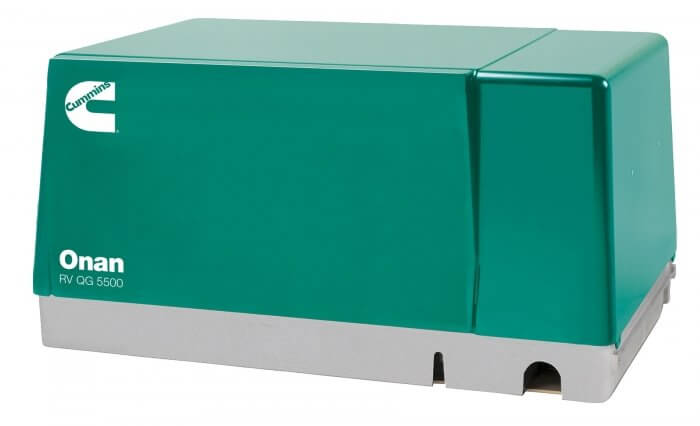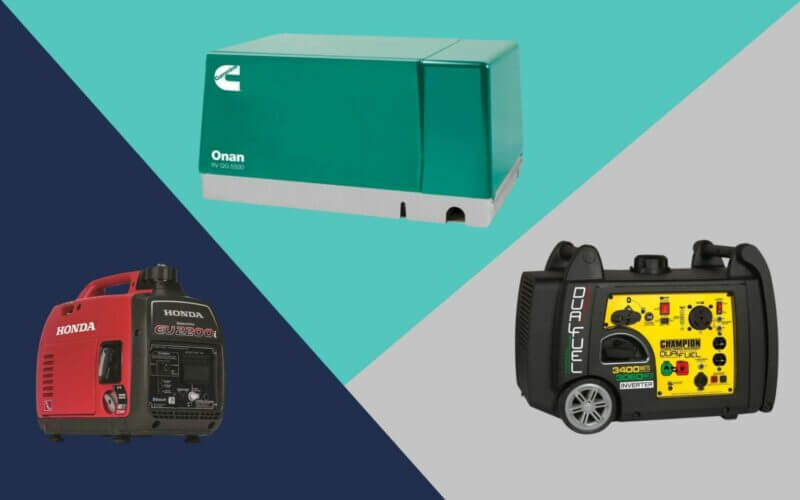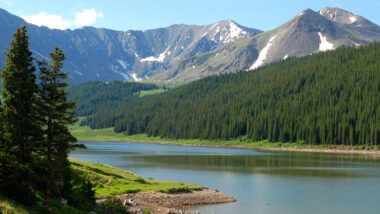Table of Contents Show
If you’re new to camping in your RV off the grid, you’re going to have lots of questions. One of the first ones, and one of the most important, might be: “What size generator do I need?”
That’s because having electricity is essential for most of us. How much electricity you’ll need is something you need to know. It’s a critical factor in whether your boondocking experience is a successful venture or ends up being a dry run.
Any time you can’t rely on shore power or solar, it’s nice to have a trusty generator on hand. And even if you already have a built-in power supply, it pays to have a backup.
Types of Generators
It helps to be acquainted with what’s available when choosing a portable generator for your RV trailer.
Construction generators, which are the traditional or standard kinds of generators, shouldn’t be your first choice simply because they’re prone to power surges and loud.
If you’ve ever used one, you might have noticed dimming or flickering lights. These sudden rushes of electricity can damage some of the more delicate electronic accessories you’re likely to have on board, things like laptops, tablets, and cell phones.
Inverter generators are the best choice for RV use because they’re quieter and more efficient. They’re usually inside an insulated casing, but this isn’t the only reason they’re not as loud. They also have microprocessors that regulate the current they produce, which means they’re not running at full speed all the time but produce only the amount of power you need.
Not to get too technical, but the output from most inverter generators is called a pure sine wave. This is a cleaner signal that won’t damage your sensitive electrical devices.
Understanding Starting, Running, and Surge Wattage
Regardless of what generator you choose, you’ll need to know a few more terms. Your generator size will also depend on how many watts it produces and what kind of watts they are.
Starting watts (also called surge watts and peak watts) are how much a generator produces in a short burst. Continuous watts, on the other hand, are what the generator produces over an extended period. They’re sometimes called running watts, and sometimes you’ll see the term “rated watts.”
Try thinking of it this way: Starting watts get things going while continuous watts keep them running.
How many watts will you need? It depends on what you’ll be operating. It helps that all your appliances and accessories won’t be running simultaneously, but they add up quickly.
To give you an idea, electric ranges and water heaters are power hogs that require something in the neighborhood of 2000-2500 running watts. An RV refrigerator needs 600 to 1000 running watts depending on size, and a water pump will drain 1,000 to 2,000 watts.
Many online guides will estimate how many watts your RV appliances will need, but the best method to discover your RV’s electricity usage is to check out the owner’s manuals for each electric appliance. Doing so will give you a rough starting point for calculating generator size.
Decide What Size You Need in a Generator
To determine what size you need, estimate the maximum number of watts you’ll be using at one time. You’ll want a generator that’s slightly bigger than that number.
The most common generators for RVs are smaller, producing between 1,500 and 4,000 watts. Look for more wattage if you’ll be running your air conditioning.
Small Portable Generator
- Ideal for TV, DVD, satellite, fridge, coffee pot, and more
- Super quiet and lightweight
For a small portable generator, you can’t go wrong with the Honda EU2200i. It cranks out 1,800 starting watts and 2,200 surge watts. That’s a lot of power in a small package that weighs just 50 pounds. It also continuously monitors carbon monoxide levels and shuts down automatically if they get too high.
The budget option for this range of generators is the 2000 watt Predator from Harbor Freight. Its low cost, lightweight, and great reviews make it an excellent choice for those looking for a more wallet-friendly option.
These generators are great for those with a smaller RV or minimal power needs. It also works great to supplement a solar install for those cloudy days.
Portable Generator
For bigger jobs, the Champion 3400 offers 3,100 running watts. With its “dual fuel” capabilities, it has and will run for 7.5 hours on gas and 14.5 hours on propane. At just under 96 lbs, it’s almost twice the weight of the smaller Honda unit. It falls into the category of medium-sized generators.
If you are looking for a budget option, you can’t go wrong with the Predator 3500 from Harbor Freight. We have been using this model for over 2 years and it has never had an issue. While it doesn’t have dual-fuel capabilities, it handles everything we have thrown at it.
These generators can run most RV air conditioner systems for those who are looking to stay cool while boondocking. You can power a decent amount of systems in your RV at the same time but power management will still be necessary since you can quickly overload these with multiple high-use appliances.
Those of you looking to power all of your appliances in your RV like you are on full hookups should check out the next option.
Whole RV Generator

On the heavy-duty end of the spectrum are the large built-in generators that can deliver more than 10,000 watts. Cummins generators, for instance, have been a dependable mainstay in the RV industry for decades.
These come in gas/diesel versions on motorhomes and toy haulers and they get plumbed directly into the fuel tanks. Since most fifth wheels don’t have a fuel tank, they usually have a propane model.
These types of generators are normally installed by the manufacturer or a dealership since they are a more involved process.
Hopefully, this article has given you some insight into your question, “What size generator do I need?”
Last update on 2025-01-19 / Affiliate links / Images from Amazon Product Advertising API








We examined both the Honda and the Predator options you mentioned. I’m a Honda geek and love their engine tech but for the reliability and price intersection I bought 2 Yamaha 2200’s from Costco for 499.00 each. They weigh 47 pounds and come with link cables to run them in dual mode. Reliability is neck and neck with Honda at 2 for the price of 1. Check them out.